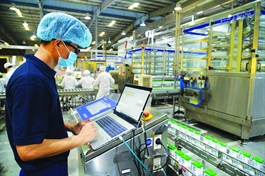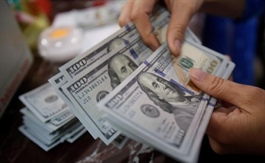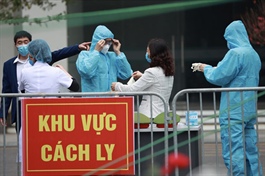Growth now cannot mean future catastrophe
Growth now cannot mean future catastrophe
The dual impact of the pandemic and the Fourth Industrial Revolution have pushed businesses to rethink their development strategies. VIR's Mai Dang spoke with Alain Cany, chairman of EuroCham Vietnam, about sustainability and a guideline for businesses in the new normal.
What have businesses in Vietnam done well and what needs to improve to respond to the new changes post-pandemic?
Throughout my time in Vietnam, I have always been particularly impressed by Vietnam’s ability to adapt. The country is currently moving up the global value chain, aiming to become a developing, upper-middle-income country with modern industry by 2030.
As such, companies in Vietnam have had to make many fundamental changes, both in terms of jumping from an export-oriented market economy to a high-tech manufacturer as well as in terms of having to adapt to a continuously changing business environment.
Companies in Vietnam must also more rapidly digitise all aspects of the country’s economy. Digitalisation will help promote growth by making it easier for businesses to make the most of Vietnam’s competitive economic advantages through the reduction of administrative difficulties.
While Vietnam’s green and digital development is without a doubt currently moving at an impressive pace, businesses in Vietnam should throw themselves into this process as this presents a perfect opportunity for Vietnamese businesses to leap-frog their peers in Europe and elsewhere.
Greening up is no longer an option, it is a must for businesses to sustain in this new era. What is your definition of a sustainable company post-pandemic?
Sustainable companies must satisfy consumers without harming future well-being and livelihood. Growth now cannot mean future catastrophe. The opposite must be true. Sustainable companies must make the world a better place now and in the future. This requires a complete transformation in the way we all think.
For this, sustainable practices must be applied across all operations, including in manufacturing, distribution, all steps of the supply chain, and so on. This demands mastery of topics like circular economics and clean manufacturing best practices, as well as innovation to invent clever solutions to unfamiliar challenges.
What is the recipe for a sustainable business strategy?
While green, sustainable, and environmentally friendly are the buzzwords of this era, it is not always clear for companies how to apply these concepts in practice. Businesses around the world are still learning how to implement sustainable best practices while at the same time ensuring stakeholder happiness, employee satisfaction, and overall business success.
As a result, innovation and creativity are essential to sustainability in the post-pandemic era. Without them, it is impossible for businesses to adapt and lead the world into the future.
Adaptiveness and flexibility are also equally important. The unique, difficult changes being experienced in the age of climate change require rapid action.
Without the ability to move and adjust quickly based on expertise and current circumstances, success is unlikely. For this, companies must be clear-sighted enough to recognise large, systemic problems. Following this, companies must quickly and appropriately reorient their strategies in response.
People say human resources must be the centre of a sustainable business development strategy. To what extent do you agree with this opinion and how should human capital initiatives be adjusted to meet this new demand?
Since humans are both the engine and the beneficiaries of sustainability, human capital must be put to use. Vietnam’s labour force is large. Its population is young and has high expectations. This is a huge asset for Vietnam’s development.
International firms have realised this, thus more and more jobs are flowing to Vietnam. As a result, those seeking work have plenty of employment opportunities. This requires HR professionals to be very aware of and responsive to employee needs. This responsiveness must also be paired with agility, as acting too late is harmful to talent retention and development.
Instead of strictly following past actions, talent management initiatives must be dynamic and custom-tailored to the needs and goals of employees. Doing so and being truly adaptive to the current ever-changing talent landscape often requires painful, transformative changes.
HR professionals should not shy away from this regardless of its difficulty. Even though this is very consequential to long-term success, it is still a relatively unfamiliar concept for many businesses. This must be corrected.
Talking about HR professionals, what are the traits of a successful HR leader in this era?
Most of all, successful HR leaders must have an agile mindset. Any adjustments should be based on business-driven insights while staying true to the overall mission of the company. Being agile in this way is not easy though. It calls for curiosity and courage.
Like most other fields, a desire for knowledge and understanding is hugely beneficial. Curiosity is a necessity for recognising and understanding the nature of complex HR problems as well as their possible solutions. HR leaders must always have a natural curiosity to get beyond a surface-level understanding of challenges.
Implementing solutions to new challenges often requires bold, systemic changes to HR orientation. HR professionals must be courageous, or brave enough to think outside of the box and move into uncharted territory without fear of failure.
This is the first time you joined Vietnam HR Awards – a prestigious HR award in Vietnam recognising responsive and effective HR strategies – what are you looking forward to seeing in the applications?
Based on my experience, it is rare for companies to effectively create and implement creative and genuine HR initiatives.
Creativity is undoubtedly difficult. There is no tried and true formula for creative success. It requires natural innovative talent alongside bravery in the face of the unknown. The ability of HR professionals to apply creative HR solutions also reflects a deep understanding of both their specific company as well as the business landscape generally.
The ability to be genuine and show sincere consideration for employees is also relatively rare. Doing so requires a true understanding of employees and a solid commitment to improving their well-being.
If companies or HR professionals are not genuine in their approach, it is difficult for them to understand employees and adapt to the rapidly changing talent landscape.
























